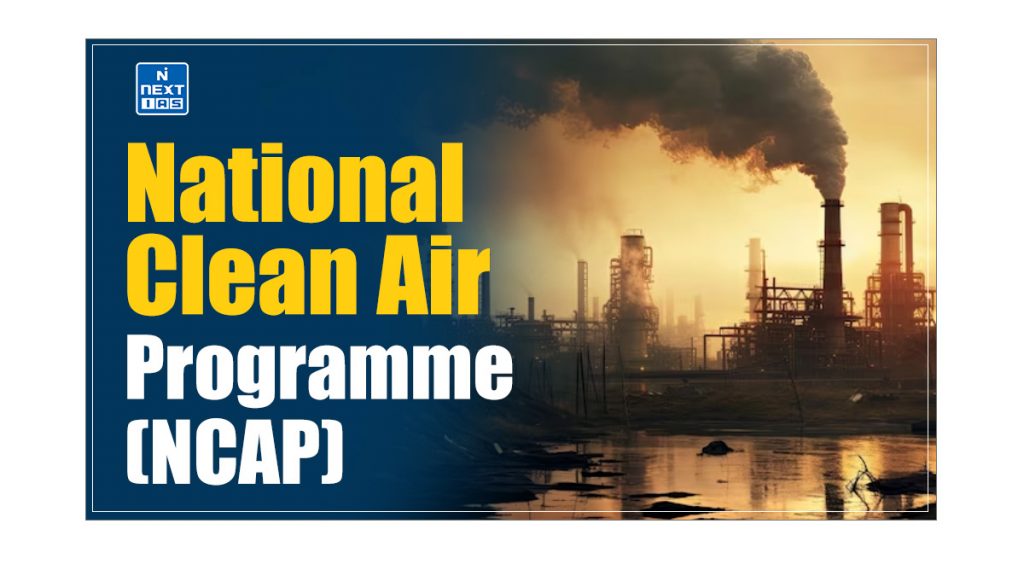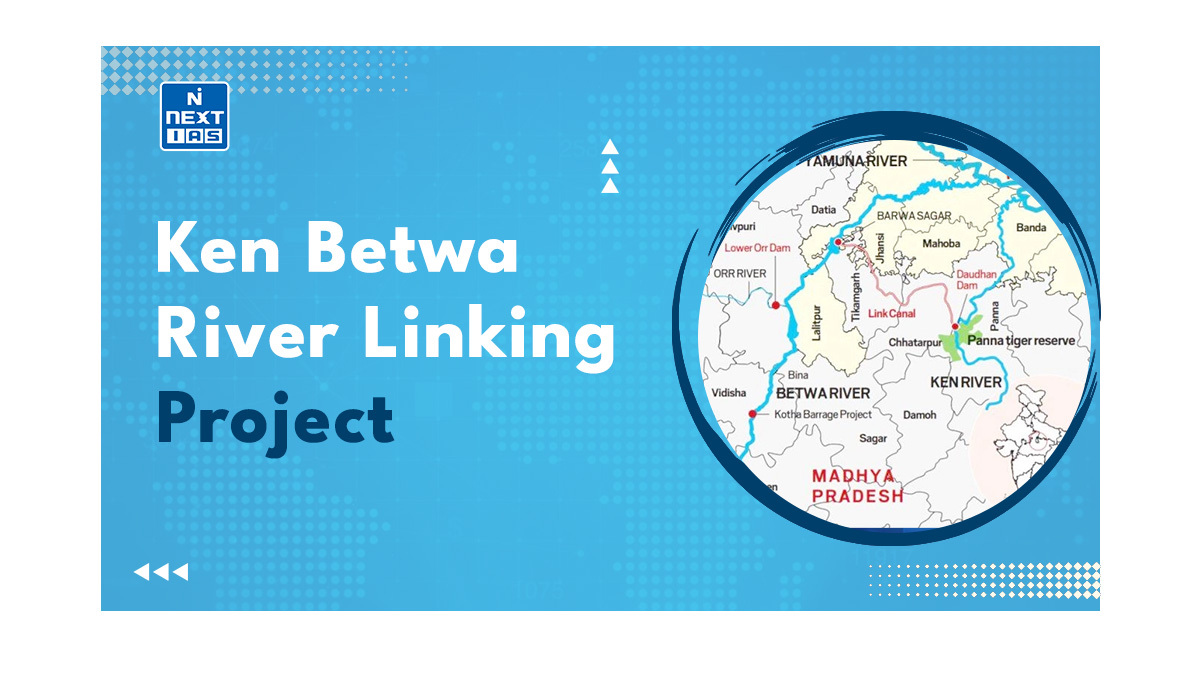
The National Clean Air Programme (NCAP) represents a significant step in India’s efforts to combat air pollution and improve air quality across the country. Ever since its launch, it has aided significantly in addressing the concerns of air pollution and its impact on public health and the environment. This article aims to provide a comprehensive overview of the National Clean Air Programme (NCAP), its needs, objectives, provisions and other related concepts.
About National Clean Air Programme (NCAP)
- The National Clean Air Programme (NCAP) was launched in 2019 as a long-term, time-bound, national-level strategy to tackle the country’s air pollution problem comprehensively.
- The National Clean Air Programme (NCAP) aims to augment the air quality monitoring network nationwide and strengthen awareness and capacity-building activities.
- National Clean Air Programme (NCAP) aims to achieve a 20-30% reduction in Particulate Matter concentrations by 2024, keeping 2017 as the base year for comparing concentrations.
- Recently, the centre has set a new target of a 40% reduction in PM concentration in cities covered under NCAP by 2026.
Needs for National Clean Air Programme
- India faces severe air pollution challenges due to rapid urbanisation, industrialisation, and vehicular emissions.
- According to various reports, air pollution in Indian cities often exceeds safe limits, leading to serious health issues such as respiratory and cardiovascular diseases.
- In response to these challenges, the National Clean Air Programme (NCAP) was developed as a comprehensive framework to mitigate air pollution and enhance air quality.
| What is Air Pollution? – Air Pollution is the contamination of the atmosphere with harmful substances that can have adverse effects on human health, ecosystems, and climate. – Air Pollution is caused by the release of harmful gases and particulate matter into the atmosphere. – Major sources of Air Pollution include industrial emissions, vehicular exhaust, and the burning of fossil fuels. – Air Pollution is linked to respiratory diseases, cardiovascular problems, and global phenomena like acid rain and climate change. Read our detailed article on Air Pollution. |
Objectives of National Clean Air Programme
The broad objectives of National Clean Air Programme (NCAP) are:
- To augment and evolve effective and proficient ambient air quality monitoring networks across the country to ensure a comprehensive and reliable database
- To have efficient data dissemination and public outreach mechanisms for timely measures for prevention and mitigation of air pollution and for inclusive public participation in both planning and implementation of the programmes and policies of government on air pollution
- To have a feasible management plan to prevent, control and decrease air pollution.
Approach of National Clean Air Programme (NCAP)
- Collaborative, multi-scale and cross-sectoral coordination between the concerned central ministries, state governments and local bodies.
- Mainstreaming and integrating the existing policies and programmes, including the National Action Plan on Climate Change (NAPCC) and other initiatives of the Government of India about climate change.
- With reference to NAPCC, the main focus will be on mainstreaming the initiatives under its five national missions: the National Solar Mission, the National Mission for Enhanced Energy Efficiency, the National Mission on Sustainable Habitat, the National Mission for a Green India, and the National Mission for Sustainable Agriculture.
- While many of these policies and programmes are already part of the current actions, they may need a change in direction, enhancement of scope and effectiveness and an accelerated implementation of time-bound plans.
- Use the smart cities framework to launch the NCAP in smart cities that are on the list of non-attainment cities.
- The NCAP will be dynamic and continue to evolve based on additional scientific and technical information as it emerges and responds to available international best practices and experiences.
Implementation of National Clean Air Programme
- National Clean Air Programme (NCAP) discusses collaborative, multi-scale, cross-sectoral coordination between central ministries, state governments, and local bodies.
- The CPCB will execute the nationwide programme for the prevention, control, and abatement of air pollution within the framework of the NCAP.
- National Clean Air Programme (NCAP) will be “institutionalised” by respective ministries and will be organised through inter-sectoral groups, including the Ministry of Finance, Ministry of Health, NITI Aayog, and experts from various fields.
Non-Attainment Cities under NCAP
- Under the National Clean Air Programme (NCAP), a non-attainment city is one whose air quality did not meet the national ambient air quality standards from 2011 to 2015.
- City-specific action plans have been formulated for 131 non-attainment cities whose air quality is worse than the National Ambient Air Quality Standards.
- These cities are being monitored under the NCAP for improving air quality.
- The Smart Cities programme will launch the NCAP in the 43 smart cities that are on the list of these non-attainment cities.
Analysis of the National Clean Air Programme
- A recent analysis revealed that NCAP has failed to achieve its target.
- According to the environmental think tank Centre for Science and Environment, trends in particulate matter pollution (PM2.5) between the cities under the National Clean Air Programme (NCAP) and those outside its ambit have remained the same.
- Only 14 of 43 (NCAP) cities registered a 10% or more reduction in their PM2.5 level between 2019 and 2021.
- Out of 46 non-NCAP cities with adequate data, 21 recorded significant improvement in their annual PM2.5 value, with a 5% or more decline between 2019 and 2021.
- 16 NCAP cities and 15 non-NCAP cities registered significant increases in their annual PM2.5 levels, with nearly identical numbers.
- The analysis mentions that Punjab, Rajasthan, and Maharashtra dominated the list of cities that registered a significant increase in PM2.5 levels between 2019 and 2021, and Chennai, Varanasi, and Pune showed the most improvement among NCAP cities.
- Haryana, Madhya Pradesh, and Gujarat dominate the list of non-NCAP cities with large increases in air pollution.
Challenges Faced by National Clean Air Programme
Some of the major implementational challenges faced by the National Clean Air Programme include the following:
- Resource Allocation: Financial and human resources for implementing and monitoring air quality improvement measures still need to be improved.
- Coordination Among Stakeholders: Effective coordination among government departments, industries, and communities takes work.
- Data Accuracy and Transparency: More accurate and transparent air quality data are essential for assessing progress and making informed decisions.
- Public Participation: Engaging the public and raising awareness about the importance of air quality are critical to the programme’s success.
Conclusion
The National Clean Air Programme (NCAP) represents a comprehensive and ambitious effort to address India’s critical air pollution issue. The National Clean Air Programme (NCAP) aims to create a healthier and more sustainable environment by setting clear targets, promoting research and innovation, and involving various stakeholders. Continued commitment and collaborative efforts are essential to achieve the programme’s goals and ensure cleaner air for future generations.
Frequently Asked Questions (FAQs)
What is the National Clean Air Program?
The National Clean Air Program (NCAP) is an initiative by the Indian government to reduce air pollution across the country. Launched in 2019, its goal is to improve air quality by 20-30% by 2024, focusing on 132 cities identified as non-attainment areas (cities that have failed to meet national air quality standards).
What are the key Features of the National Clean Air Program?
Some key features of the National Clean Air Program (NCAP) include expanding the air quality monitoring network, promoting cleaner technologies, ensuring better waste management, and reducing industrial, vehicular, and household emissions.






